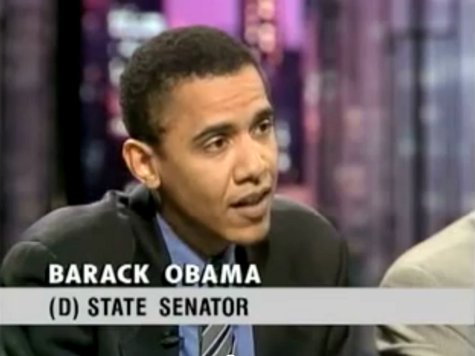Many people were taken in by Barack Obama’s hopey-changey 2008 campaign. They thought that this was the real Barack Obama — a man of optimism and vision. But the 2012 campaign has shown a side of Obama that the American public seems to be increasingly disturbed by. What they don’t know is that it was 2008 that was the exception to the Obama campaign strategy; 2012’s racially polarizing campaign is right up Obama’s historical alley.
Back in 1999, Illinois State Senator Barack Obama made clear what he thought of black voters: they were all the same. Or, at the very least, they ought to all vote the same. In an interview with Chinta Strausberg of the Chicago Defender, he explained that the black legislative caucus wasn’t unified enough on economic development.
The then-state senator was talking about a plan for riverboat casinos, which he opposed because it “took care of some already wealthy people.” He hoped to shame black politicians who voted for the riverboat casinos, to make them “feel guilty enough about some of the things” they do “for these rich folks.”
and is clearly articulated. Everybody tends to be lone agents in these situations.”
In Obama’s mind, all black legislators had to vote the same way. Why? Because of their race.
While Obama hedged his bets and said that black pols don’t need to be “monothilic,” he did encourage them to unite to use their shared “leverage” as black leaders. “If we’re going to be effective, we’re going to have an agenda and unify around that agenda at least on some of these high profile issues where we do have some leverage,” Obama said.
State Senator Mary E. Flowers, another black politician, disagreed with Obama and criticized him in the Defender. “We’re all offsprings of Africans and on the continent of Africa there are different countries that have different tribes and those tribes speak the same languages others don’t. The Black Caucus is from different walks of life. I don’t expect all of the whites to vote alike,” Flowers said. “Why is it all of us should walk alike, talk alike, and vote alike?”
Obama’s racialist approach to legislative agenda should have been deeply disturbing then. Legislators are elected to represent all of their constituents, not to act in some sort of racial solidarity with those who share their heritage or skin color. Obama didn’t believe that then. And with his intensely polarizing and fragmenting campaign strategy in 2012, he likely doesn’t believe that now, either.

COMMENTS
Please let us know if you're having issues with commenting.